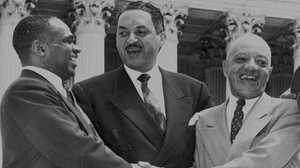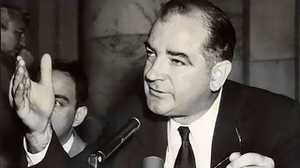Eisenhower's Early Career
On June 5, 1944, while Allied troops headed across the English Channel toward the beaches of Normandy, General Dwight D. Eisenhower composed a hand-written press release. It read, in part, "Our landings have failed, and I have withdrawn the troops. The troops... did all that bravery and devotion to duty could do. If any blame or fault attaches to the attempt it is mine alone." Hoping he would never need to use it, Eisenhower then slipped the note into his wallet.

The career military man from Abilene, Kansas had just given the go-ahead to launch the greatest air and sea invasion in the history of the world. Upon his directive 5000 ships and 150,000 soldiers set out in a bold attempt to liberate France from her Nazi captors. Eisenhower knew full well that the amphibious invasion would most likely result in a staggering number of Allied deaths, even if it succeeded. And if it failed? The tide of the war and the fate of Europe hung in the balance. With orders given and the Allied forces en route, Eisenhower could do nothing but sit and wait.
Waiting was not a new experience for Dwight Eisenhower. During nearly 30 years of military service he had waited for an opportunity to lead men on the field of battle. By the early 1940s Eisenhower could look back on a distinguished military career. He had proven himself to be the embodiment of the modern military ideal -- a methodical manager of men and resources. He had served under and impressed some of the brightest stars in the military -- Conner, Pershing, MacArthur. Still, in his mind, events had played themselves out in such a way as to deny him the opportunity to fully prove his worth as a strategist and warrior.
Eisenhower graduated from West Point in 1915 and hoped to serve in the glamorous cavalry corps. Instead, he found himself stationed just outside San Antonio, Texas, training infantry troops and coaching football at Fort Sam Houston. In 1917, when the United States joined the Allied effort in World War I, the prospect of directing troops on Europe's western front excited Eisenhower. But his ambition was frustrated by his very competence -- his superiors were reluctant to send him overseas due to his success in preparing others for battle, on the gridiron and in combat.
As war raged in Europe, Eisenhower found himself moving from one states-side commission to another. From Fort Sam Houston to Fort Oglethorpe, Georgia, then on to Fort Leavenworth, Kansas, and Fort Meade, Maryland and finally to Camp Colt near Gettysburg, Pennsylvania. At each posting he exerted as much pressure as the military chain of command would allow in promoting himself as combat ready. Finally, on October 14, 1918, his 28th birthday, the Army bestowed upon Eisenhower a gift he had long coveted -- he was given orders to take command of an armored unit in France beginning on November 18th.
Time was not on his side, however. On November 11, 1918, the armistice ending the Great War was signed. World War I was over, and Dwight Eisenhower, professional soldier, had spent it on the sidelines, nowhere near the field of action. To a colleague he vowed, "By God, from now on I am cutting myself a swath and will make up for this."
But Eisenhower's determination was thwarted by the Army's demobilization efforts. In the aftermath of World War I, isolationist sentiment within the country resulted in the U.S. reducing its army to the world's 16th largest. Promotions were scarce and Eisenhower remained a major for 16 frustrating years. During that time Eisenhower skillfully aligned himself with a series of influential mentors, seeking assignments that would allow him to further his expertise in military techniques and tactics. One such assignment came when he was named as an instructor at Infantry Tank School under the tutelage of Colonel George S. Patton. Patton had graduated from West Point five years before Eisenhower, and unlike Ike, he had seen action in World War I. Eisenhower eagerly absorbed Patton's instruction regarding tank deployment, and the two formed what would be a long, if occasionally contentious, friendship.
Tragedy struck in 1922. Eisenhower's first son, nicknamed "Icky," contracted scarlet fever and died at the age of three. It was a tragedy Eisenhower later called "the worst disaster of my life, the one I have never been able to forget completely." Despondent, Eisenhower threw himself into his work.
In 1922 Eisenhower was assigned to help protect the Panama Canal and worked under General Fox Conner. The hard-driving Conner possessed a rigorous intellect, especially in the area of military history and tactics. The two men developed a close relationship. Conner became a tutor of sorts to Eisenhower, challenging him to expand his knowledge of the ancient classics and the modern masterpieces on waging war. Thanks to Conner, Eisenhower began to see war in societal and global terms.
With the passing years, Eisenhower continued to impress his superiors as he increased his store of knowledge and experience. He later wrote, "My ambition in the Army was to make everybody I worked for regretful when I was ordered to other duty." Working in the War Department in the 1930s, he came to the attention of General Douglas MacArthur who insisted that Eisenhower join him in the Philippines as his chief of staff. From 1936 to 1939, Eisenhower labored in the Philippines, along with MacArthur, to shore up Filipino defenses against a feared Japanese attack. This was not a happy time for Eisenhower -- his wife, Mamie, was ill and his best friend, James Ord, had been killed in a plane crash.
In September 1939, the Nazis invaded Poland and World War II was underway. Eisenhower soon found himself commanding an infantry battalion at Fort Lewis in Washington state. In June 1941, he was appointed to the position of chief of staff under General Walter Krueger of the Third Army. He was told to report to Fort Sam Houston, the site of his first military posting. It seemed as if events had come full circle. At 50 years of age, Eisenhower was now beginning to see his career as nearing its end. Little did he know that it was just beginning.
Five days after the Japanese attacked Pearl Harbor, Eisenhower was summoned to Washington by General George Marshall. Marshall needed a plan to defend the Philippines from Japan and chose Eisenhower for the job. Drawing on knowledge acquired during his years in the Philippines, Eisenhower concluded that the Filipino defenses would quickly be overrun by superior Japanese numbers and strength. He recommended that General MacArthur try to hold out long enough for a U.S. base of operations to be built in Australia. Eisenhower's bleak prediction proved accurate, and his swift and decisive planning impressed Marshall. He was promoted to brigadier general and placed in charge of domestic planning for the American war effort in the Far East.
Despite a successful career, Eisenhower still felt limited by his lack of battlefield experience. He made no effort to conceal from Marshall his desire to command combat troops. One heated exchange between the two resulted in Eisenhower exclaiming, "... I came into this office from the field and I am trying to do my duty. I expect to do so as long as you want me here. If that locks me to a desk for the rest of the war, so be it!" A short time later Marshall named Eisenhower commander of the European theater of operations. On June 24th Eisenhower arrived in England to take up his assignment.
Shortly after his arrival in England, Eisenhower presented a plan for a cross-Channel invasion of Nazi-controlled France to his British counterparts. They thought the plan too risky, and shelved it in favor of an invasion of North Africa designed to drive out the Germans and Italians. Eisenhower, who had never led a single soldier into combat, would now lead 60,000 in the North African campaign. His lack of field experience showed. The Allies suffered a significant set-back at the Kasserine Pass in Tunisia, but after seven months of fierce fighting and heavy losses, they managed to defeat the Germans and push on into Italy. Eisenhower had made the necessary adjustments in personnel and strategy to turn the American defeat at Kasserine into an Allied victory in North Africa.
That December, President Roosevelt arrived in North Africa to confer with Winston Churchill and Josef Stalin and to set a date for the long awaited invasion of Nazi-occupied Europe. Operation Overlord would be the largest amphibious landing in history with logistics so complex as to defy comprehension. The effort would require cooperation between contentious American and British generals, as well as the integration of armies from the expanses of the British empire with units from the defeated Polish and French armies. Only one man had the expertise and the skills to organize such a diverse force -- the General who in North Africa, had shown himself capable of team work. When Roosevelt asked Eisenhower how he felt about his new title, "Supreme Commander," Eisenhower replied, "it has a ring of importance, like Sultan."
As he waited in his command trailer for word regarding the June 6, 1944 Allied invasion of Normandy, Eisenhower said to his personal assistant, Kay Summersby, "I hope I know what I'm doing. There are times when you have to put everything you are and everything you have ever learned on the line." In orchestrating and leading the D-Day assault on the beaches of Normandy, France, Eisenhower had certainly put it all "on the line." His gamble paid off handsomely. After meeting initially heavy resistance from German forces, the Allies were successful in winning control of the beach. When Eisenhower went ashore on June 12th, German forces had been driven back and the liberation of France was underway.
Many lives would be lost before Germany surrendered, but the success at Normandy irrevocably turned the tide in favor of Eisenhower and the Allies. Eisenhower took the victory in France and moved methodically, and patiently, pushing the Germans back toward their own border and to eventual defeat.
British and American historians continue to debate whether Eisenhower's slow advance along all fronts delayed the war unnecessarily and cost many more lives. Some argue that a more concentrated push would have taken advantage of the disarray of the German army in the aftermath of Normandy and would have resulted in a quicker victory. But Eisenhower's strategy in the closing months of the war reflected the lessons he had learned during his long career in the military. The Supreme Commander of the Allied forces had long ago learned the value of calculating patience.







